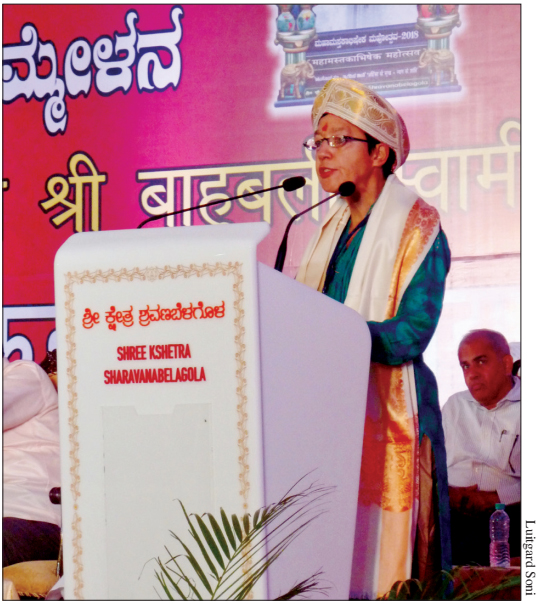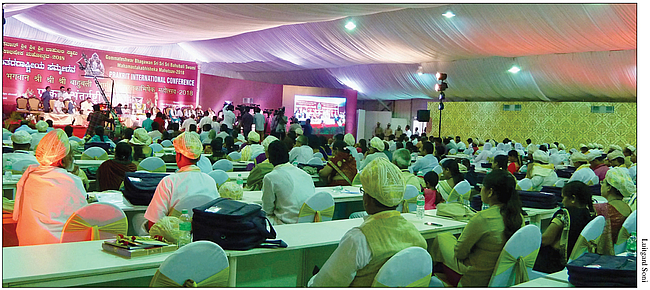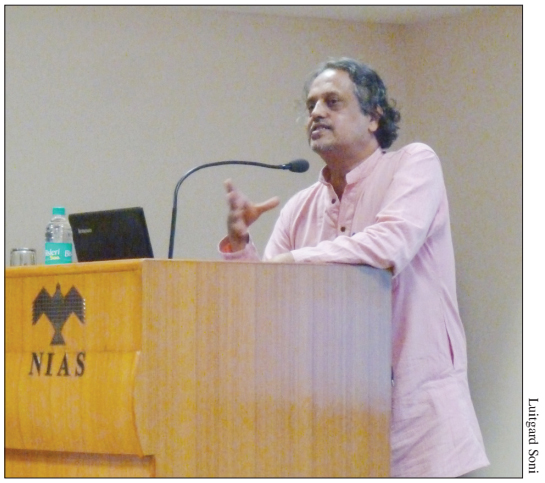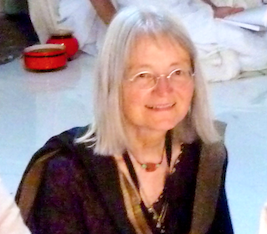
Centre of Jaina Studies Newsletter: SOAS - University of London
The Mahāmastaka-abhiṣekha of the colossal statue of Śrī Gommaṭeśvara Bāhubalī in Śravaṇabelgola, celebrated in a twelve-year cycle, is being staged starting from February 2018. As a festive prelude to it, the First International Prakrit Conference was held on 3-6 November 2017 in Śravaṇabelgola, Karnataka, and it presented itself as an extraordinary academic event. In the sequel to several past National Prakrit Conferences and Seminars connected with the Bāhubalī Prākrita Vidyāpīṭha, this First International Conference stands also as a sign-post for the Prakrit-University to be opened in 2019.
The four-day conference was a multifaceted gathering in honour of Prakrit and its heritage and was a powerful cultural statement under the auspices of Svasti Śrī Cārukīrti Bhaṭṭāraka Svāmijī. It was graced by the presence of many Jaina nuns and monks in a Guruvandana gathering, honoured by persons from public life, arts, education and politics, and hosted an array of about 150 scholars whose research work, in one way or the other, pertains to the Prakrit languages.
The inaugural function celebrated the event with prayers and praises and a warm welcome speech by Professor Hampa Nagarajaiah. The president of the conference, Prem Suman Jain tuned the audience into the theme of the conference and a very old illustrated palm leaf manuscript of the Gommaṭasāra by Nemicandra Siddhānta Cakravarti was displayed ceremoniously in a very dignified way.
Nalini Balbir (Sorbonne-Nouvelle University, Paris) delivered the keynote address which brought on stage a scholarly view and an inspiring perspective on Prakrit and on the present state and future tasks of Prakrit studies. Her speech underpinned the significance of a Prakrit International Conference particularly in view of the fact that Prakrit does not have the status of a 'Classical Language' as do Tamil, Sanskrit, Kannada, Telugu and Odia, in spite of clearly fulfilling the official criteria for eligibility. Balbir indicated the broad scope of Prakrit, its distinct relation to Sanskrit as well as the vernaculars, its prominent place in the classical Indian literary heritage, evident for example in muktaka-poetry, major epic poems, novels, in classical Indian plays, in the saṭṭakagenre, the Jaina scriptures and in inscriptions. A glance at what has been achieved for the study of the language, the edition of texts in the past decades, and at what is being done now is encouraging. Balbir mentioned that several university departments in India and abroad have Prakrit courses in their programme, that summer schools are organised, and that in Śravaṇabelgola there has been the National Institute of Prakrit Studies and Research since 1993. Editions and partial or full studies of seminal works such as the Vasudevahiṇḍī and the Kuvalayamālā have been brought out, several editions of the Āgamas can be consulted, in-depth and comparative studies of stories and their sources are available for research, as are editions of leading works of the Digambara tradition such as the Mulācāra, Bhagavatī Ārādhanā and the Ṣaṭkaṇḍāgama. With these and other examples of achievement, a challenge persists to promote the teaching of Prakrit and to coordinate the efforts to make more Prakrit texts accessible, in print as well as online.

Nalini Balbir (Sorbonne-Nouvelle University, Paris)
In the plenary academic session, the theme 'Prakrit Studies: Today and Tomorrow' was discussed and suggestions were given for the support and promotion of Prakrit studies regarding teaching and research in linguistics, history and literature. G.C. Tripathi (Delhi) pointed out that the numerous Prakrit manuscripts lying in libraries all over India call for work on a new history of Prakrit languages and for research in Prakrit texts pertaining to any discipline. He also drew attention to the beauty of Prakrit recitation and emphasized the importance of an actual teacher-taught situation for the pronunciation, since the sound values can hardly be transmitted online.
Peter Flügel's (SOAS) speech focussed on essential features of the ordination of monks on the basis of 'The Ṇikkhamaṇa of Mahāvīra according to the Old Biographies'. The oldest surviving narratives on Mahāvīra's Ṇikkhamaṇa, i.e. the Āvaśyaka-Niryukti, Āyāra, and Jinacariya, appear to be retrospective constructions of late-canonical origin. From the analysis of the three main accounts few shared core-elements can be identified. Leaving the house and pulling out the hair are essential elements. Invariable named elements of the plots are dāna, chaṭṭha-bhatta and paṃca-muṭṭiya-loya. He also argued that the historical sequence of the old biographies could be determined freshly on grounds of their degrees of completeness rather than, as previously, on disputed linguistic terms. Full life stories including the funeral ceremony can only be found in much later texts.
Hampa Nagarajaiah (Bengaluru) raised the question of the neglected status of Prakrit which does not rank as a classical language in spite of its heritage and the enormous corpus of texts. For the sake of anchoring Prakrit as an important part of Indian history and culture, and to facilitate its study, Prem Suman Jain (Udaipur) emphasized the necessity of pāṭhśālās. Numerous discussants responded to these speeches and supplied valuable information about the work of several institutions all over India where Prakrit plays the central role for research.
The following two and a half days were filled with parallel academic sessions in which 140 papers of 10 minutes each were read and discussed for 5 minutes. Almost half of the papers were read in Hindi, the other half divided into English, Prakrit and Kannada. Certainly the multilingual conditions posed a taxing challenge for the discussion and the exchange of ideas, but they also reflected the reality of a polyglot academic gathering exposed to the necessity of grasping and expressing ideas in more than one language. It was in any case a most impressive experience to listen to Prakrit, quoted, recited and sung in many of the presentations and discussions.
Under the main theme of the conference, 'Prakrit Literature and Culture' the research papers covered varied areas and topics and texts: epigraphy, manuscriptology, grammar, narrative literature, epics, poetry and drama. Jaina philosophical concepts and ethics, cosmology and karma theory were dealt with in several papers, some in a more general way, but most on the basis of textual studies. Linguistic studies pertained to Pali, Prakrits and Apabhraṃśa as well as their relation to modern Indian languages. There were a few studies on medicinal plants in canonical texts, on mathematical texts, on issues contained in several canonical and post-canonical texts related to sociology, life-science and environment. Several presentations pointed out their relevance to modernity. The papers on modern Prakrit writers, contributions of women in editing Prakrit texts, Prakrit Studies of the past two decades and methods of teaching Prakrit enriched the scope of the academic sessions. The abstracts of the papers are printed in: Pāiyaṁ Abbhuṭṭhāmo Souvenir - 2017, edited by Prem Suman Jain and published by the Bahubali Prakrit Vidyapeeth and the Mahamastakabhisheka Mahotsav Committee 2018, Shravanabelagola 2017. The plan is to publish all the papers of the Conference, to be published and released at the Mahāmastaka-abhiṣeka in February 2018. In the concluding session of this First International Prakrit Conference it was announced that the recipient of the Prākṛta Jñānabhāratī International Award for 2016 was Natalia Zheleznova, Institute of Oriental Studies, Russian Academy of Sciences, Moscow, for her extensive work on Jaina philosophy and especially for her translations into Russian of works by Kundakunda and Pūjyapāda.

Also, at the valedictory function, the president of the conference Prem Suman Jain presented some of the resolutions taken at the Conference, by way of extracting the impetus provided by this event for future research. He confirmed that the work on the Gommaṭeśa Prākṛta Viśvavidyālaya, the Prakrit University, in Shravanabelgola, would start soon; further there is a plan to found a second Prakrit University in Mahāvīra's birthplace, in Vaiśālī. It was also resolved to promote the establishment of Prakrit academies in several states of India. Setting up a National Library of Prakrit Studies and Jainology in Shravanabelgola was regarded as a very important project.
The cultural programmes presented in the evenings abounded in dance, song, and play. Students competed in a Prakrit Antyākṣarī and displayed their spontaneous skills in the language. Several authors of Prakrit poems recited their compositions with verve and were applauded warmly. Celebrating, honouring and studying Prakrit with ceremony and with scholarship were the great gestures of this First International Prakrit Conference at the feet of Bahubali. An extraordinary gesture was above all the very generous hospitality provided for all the delegates; it extended to travel, accommodation, honorarium and excellent food, all of which were organized perfectly and managed with utmost care.
Workshop: The Concept of Rationality in Jaina Thought
On 9th November 2017 the National Institute of Advanced Studies (NIAS), in the wonderfully green Indian Institute of Science Campus, Bengaluru, Karnataka, hosted a one day Workshop on The Concept of Rationality in Jaina Thought, planned and realized by Sundar Sarukkai, Professor of Philosophy in NIAS. Varun Bhatta organized the day efficiently and with great care. About 40 participants and three speakers spent a whole day in lively encounters while presenting, exchanging and discussing terms, concepts, theses and particulars of Jaina rationality.
The opening lecture by Jayendra Soni (University of Innsbruck) offered a broad context for the theme of rationality: 'The Tension between Reason/Rationality and Wisdom/Mysticism in Indian Thought'. The reference by Indian systems to a reality 'as it is' (yathārtha) that is to be realised, contains a certain mystical component in its definitions as well as in the modes of its realisation as, for example, in the Jaina concept of the sentient being inherently possessing samyag-darśana, samyagjñāna, and samyak-cāritra. This aspect can be contrasted with the role of reason and rationality in epistemology. By describing the means of cognition, their numbers and their characteristics, Soni outlined the concept of cognition which is decisive for the discussion of the terms philosophy and mysticism. Another conspicuous component of Indian thinking which was described in detail are dialogue and debate reflecting reason and rationality. The key words of this lecture triggered a vivid discussion with inputs from various areas, reflecting the interests and the engagement of the persons present whose fields were philosophy, sociology, medicine, arts, science and architecture.
The next presentation involved the audience in one of the most salient epistemological positions of Jaina philosophy: Himal Trikha (University of Vienna) depicted and analysed 'The role of Rationality in Jaina Perspectivism'. Starting with the claim that falsification plays a significant role in the argumentation of medieval Jaina philosophers and linking it to Popper's model of scientific progress, Trikha highlighted Vidyānandin's attitude to the factual plurality of opinions and stated its potential for reconciling conflicting views. Vidyānandin's critical perspectivism rationally treats the tension between exclusivistic and perspectivistic positions by arguing sharply against several dissonant simplistic hypotheses and arriving at complex theories with consonant epistemic alternatives. The lecture was illustrated by several examples, citations and graphs supporting the fascinating premodern Jaina method of falsification and epistemic pluralism.

The meaningful engagement with themes of a philosophical tradition, such as Jaina rationality, was depicted in a philosophically far-reaching and intricate lecture by Sundar Sarukkai (NIAS Bengaluru) 'Implications of Jaina Rationality'. Probing the sense in which we talk about rationality in Jainism, led Sarrukai to fundamental questions as to why the theme rationality is important in connection with Indian philosophy. Indian philosophy, being a wide field where philosophical and religious systems are discernible and yet interconnected, prompts one to track the role of rationality within belief systems. Rationality in Indian medicine, logic and mathematics is yet another authentic philosophical quest. The Jaina analysis of utterances presents itself as constructing forms of reasons. The topic of plurality as addressed by Jaina thinkers is a fertile ground and important feature in the implementation of rationality as such.
The last session of the workshop was a panel discussion along with a lively, general discussion moderated by Varun Bhatta (NIAS Bengaluru). Detailed questions were put to the presenters and led to intensive discussions with regard to themes such as substance, quality and mode, the role of karma in Jainism and the relevance of syādvāda. The concept of rationality became embedded in the wider framework of Jaina metaphysics.
Luitgard Soni has a PhD from the University of Salzburg, and studied Sanskrit, Indian Philosophy and Hindi at the Banaras Hindu University. She was affiliated to the Department of Indology at the University of Marburg from 1992 until 2012. She works mainly on Jaina literature.
 Dr. Luitgard Soni
Dr. Luitgard Soni